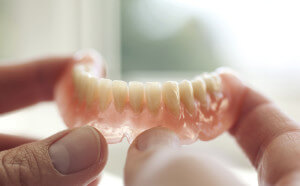 If you know anything about dentures, you know that they act as removable dental prosthetics that can replace partial tooth loss or even complete tooth loss. If you’ve learned a lot about dentures, you may think that once you become familiar with the differences between full and partial dentures, you’ve learned all you need to know. However, there’s more: You may choose from among traditional support or implant support. Get to know the details behind this topic and you’ll find yourself nearing expert-level knowledge. Keep in mind – we always enjoy offering additional information during your dental visits.
If you know anything about dentures, you know that they act as removable dental prosthetics that can replace partial tooth loss or even complete tooth loss. If you’ve learned a lot about dentures, you may think that once you become familiar with the differences between full and partial dentures, you’ve learned all you need to know. However, there’s more: You may choose from among traditional support or implant support. Get to know the details behind this topic and you’ll find yourself nearing expert-level knowledge. Keep in mind – we always enjoy offering additional information during your dental visits.
Traditionally Supported Dentures
Are you looking for a quick way to replace your missing teeth? If so, your best solution is choosing traditionally supported full or partial dentures. A full denture will allow you to replace an entire arch of missing teeth. A partial denture will restore partial tooth loss in most configurations (either missing teeth next to each other or separated by remaining teeth). The traditional support means that your dentures will receive support solely from your mouth. A full denture will remain in place as a result of suction. A partial will remain in place due in part to suction and also from the attached clasps that will fit over remaining teeth.
Implant Supported Dentures
Implant-supported full or partial dentures address the same patterns of tooth loss as traditionally supported prosthetic. However, these dentures will not rely solely on the structure and suction of your mouth for support. Instead, your treatment will first include the placement of dental implants. Over the course of several months, the implants will fuse with your jawbone. Once recovery is complete, we will fit you with customized full or partial dentures that fit snugly over the posts for a very stable fit.


